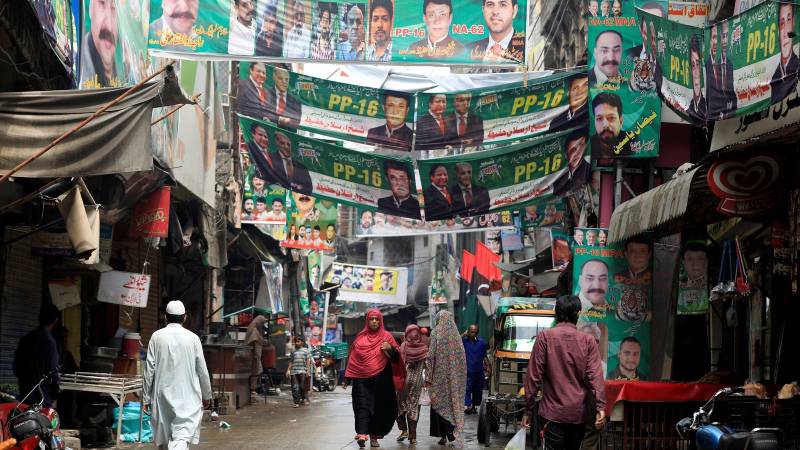
As political parties gear up for elections, navigating the intricacies of building alliances and jockeying for electoral success, a resounding call for accountability reverberates. This call goes beyond the realm of mere promises, aiming to empower the electorate to hold leaders accountable for their actions. The envisioned future is one where transparent governance, rigorous scrutiny of actions, and consequences for deviations from manifestos become the standard rather than the exception.
While elections loom in a highly polarized environment, the country finds itself at a critical juncture, grappling with economic challenges that underscore the urgency for comprehensive reforms. With a growth rate stagnant at 1.8 percent and a tax to GDP ratio languishing at 10 percent, a nation of 250 million people faces a stark reality: 40 percent struggle beneath the poverty line.
In stark contrast, a mere 330 families, commanding 90 percent of the country's wealth, consume 8 percent of the GDP, exacerbating the fiscal deficit borne disproportionately by lower and middle-income groups. This glaring imbalance not only highlights the pressing need for economic restructuring but also underscores the pivotal role of political accountability in shaping the trajectory of post-election Pakistan.
Political accountability, a cornerstone of democratic governance, demands that individuals and institutions in power act in the public interest and be answerable for their conduct. This accountability extends across various dimensions, including electoral accountability through the democratic process, legal accountability through the judicial system, and administrative accountability ensuring efficiency and effectiveness in governance.
At the core of the accountability debate lies the stark reality of wealth concentration. The affluent relish privileges, while the less privileged bear the burdens of hunger and disease. This skewed distribution reverberates in policies that prioritize preserving the advantages of the well-off rather than focusing on providing basic amenities to the majority.
The nation's growth trajectory has been uneven and unsustainable, resulting in the accumulation of insurmountable debt. Cartels manipulate politics to enjoy subsidies, manipulate prices and drive new investors out of the market. Unsurprisingly, political instability and heightened violence find their roots in the concentration of wealth and power within a small segment of the population.
The call for political accountability transcends mere rhetoric; it is a fundamental prerequisite for post-election stability and socioeconomic progress. It acts as a countermeasure to the historical trend of unfulfilled promises made during campaigns. This call demands a departure from conventional politics, urging a shift towards more transparent, responsible, and responsive governance.
Accountability, in its essence, goes beyond holding individuals or political entities responsible for their actions; it acts as a safeguard for the democratic principles upon which the nation stands. It functions as a crucial check and balance mechanism, ensuring that those in power are answerable to the people they serve.
Experts and analysts converge on the consensus that without robust accountability measures, the socioeconomic stability promised in election manifestos remains elusive. It's not merely about winning votes but about a commitment to transparent governance, where actions align with promises, and deviations from proposed plans come with consequences. This accountability imperative becomes particularly crucial in addressing the pressing needs of the populace, especially those burdened by unjust taxes on essential commodities like food and energy.
Accountability, in its essence, goes beyond holding individuals or political entities responsible for their actions; it acts as a safeguard for the democratic principles upon which the nation stands. It functions as a crucial check and balance mechanism, ensuring that those in power are answerable to the people they serve. In an era marked by heightened political polarization, accountability takes on added significance. The toxic political environment, fueled by power struggles and elite interests, underscores the imperative of returning to civility in political discourse. Without robust accountability measures, there is a heightened risk of decisions being made in the interest of a privileged few, rather than the broader population, casting a shadow on the democratic process.
Amidst these considerations, the significance of the third tier of government, embodied by grassroots democracy, becomes increasingly evident. Establishing autonomous local governments emerges as the most effective means to ensure the equitable distribution of resources and the provision of essential services such as health and education nationwide. Elevating grassroots democracy as the linchpin of political accountability and socioeconomic growth adds a nuanced layer to the discourse on accountability. Empowering local governance structures not only fosters a more inclusive and effective democratic process, but also compels political parties to be responsive to the immediate needs of the people.
As Pakistan stands at a crossroads, the path it chooses will be shaped by the country’s commitment to accountability and the elevation of grassroots democracy. With elections looming, the nation grapples not only with economic challenges but also with the imperative of building a system where promises translate into actions, governance is transparent, and the needs of the people are prioritized. The call for accountability is not just a demand for change; it is a demand for a fundamental shift in the way politics is conducted and governance is practiced—a demand for a future where stability and progress are not just aspirations but tangible realities.

